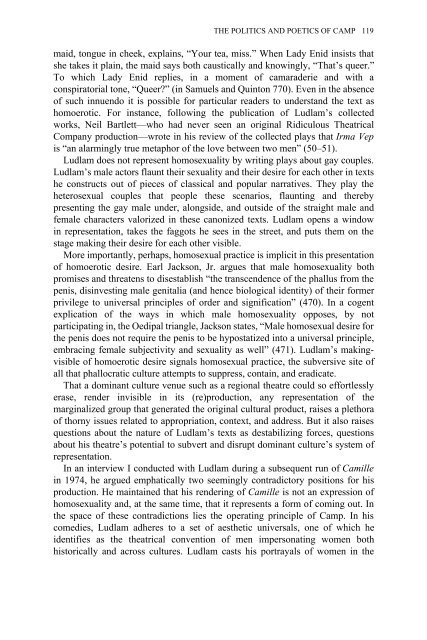Edited by Moe Meyer - Get a Free Blog
Edited by Moe Meyer - Get a Free Blog
Edited by Moe Meyer - Get a Free Blog
You also want an ePaper? Increase the reach of your titles
YUMPU automatically turns print PDFs into web optimized ePapers that Google loves.
THE POLITICS AND POETICS OF CAMP 119<br />
maid, tongue in cheek, explains, “Your tea, miss.” When Lady Enid insists that<br />
she takes it plain, the maid says both caustically and knowingly, “That’s queer.”<br />
To which Lady Enid replies, in a moment of camaraderie and with a<br />
conspiratorial tone, “Queer?” (in Samuels and Quinton 770). Even in the absence<br />
of such innuendo it is possible for particular readers to understand the text as<br />
homoerotic. For instance, following the publication of Ludlam’s collected<br />
works, Neil Bartlett—who had never seen an original Ridiculous Theatrical<br />
Company production—wrote in his review of the collected plays that Irma Vep<br />
is “an alarmingly true metaphor of the love between two men” (50–51).<br />
Ludlam does not represent homosexuality <strong>by</strong> writing plays about gay couples.<br />
Ludlam’s male actors flaunt their sexuality and their desire for each other in texts<br />
he constructs out of pieces of classical and popular narratives. They play the<br />
heterosexual couples that people these scenarios, flaunting and there<strong>by</strong><br />
presenting the gay male under, alongside, and outside of the straight male and<br />
female characters valorized in these canonized texts. Ludlam opens a window<br />
in representation, takes the faggots he sees in the street, and puts them on the<br />
stage making their desire for each other visible.<br />
More importantly, perhaps, homosexual practice is implicit in this presentation<br />
of homoerotic desire. Earl Jackson, Jr. argues that male homosexuality both<br />
promises and threatens to disestablish “the transcendence of the phallus from the<br />
penis, disinvesting male genitalia (and hence biological identity) of their former<br />
privilege to universal principles of order and signification” (470). In a cogent<br />
explication of the ways in which male homosexuality opposes, <strong>by</strong> not<br />
participating in, the Oedipal triangle, Jackson states, “Male homosexual desire for<br />
the penis does not require the penis to be hypostatized into a universal principle,<br />
embracing female subjectivity and sexuality as well” (471). Ludlam’s makingvisible<br />
of homoerotic desire signals homosexual practice, the subversive site of<br />
all that phallocratic culture attempts to suppress, contain, and eradicate.<br />
That a dominant culture venue such as a regional theatre could so effortlessly<br />
erase, render invisible in its (re)production, any representation of the<br />
marginalized group that generated the original cultural product, raises a plethora<br />
of thorny issues related to appropriation, context, and address. But it also raises<br />
questions about the nature of Ludlam’s texts as destabilizing forces, questions<br />
about his theatre’s potential to subvert and disrupt dominant culture’s system of<br />
representation.<br />
In an interview I conducted with Ludlam during a subsequent run of Camille<br />
in 1974, he argued emphatically two seemingly contradictory positions for his<br />
production. He maintained that his rendering of Camille is not an expression of<br />
homosexuality and, at the same time, that it represents a form of coming out. In<br />
the space of these contradictions lies the operating principle of Camp. In his<br />
comedies, Ludlam adheres to a set of aesthetic universals, one of which he<br />
identifies as the theatrical convention of men impersonating women both<br />
historically and across cultures. Ludlam casts his portrayals of women in the


